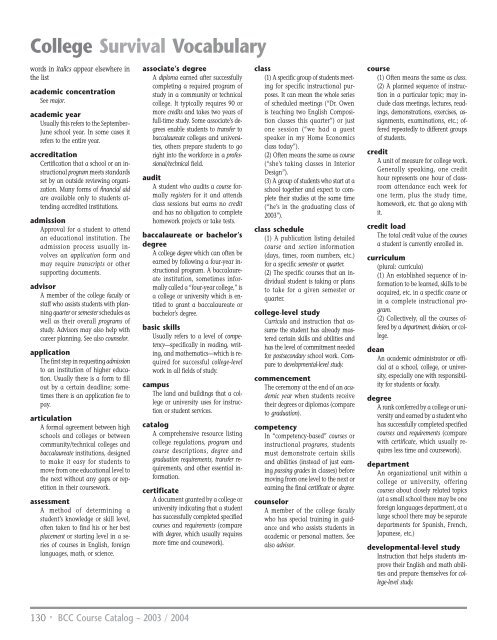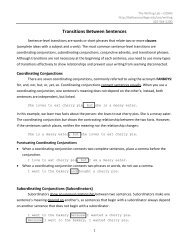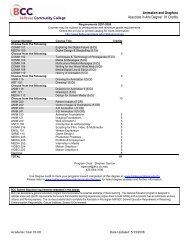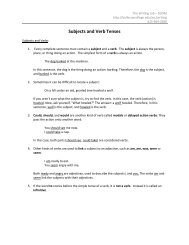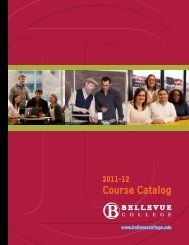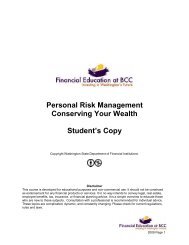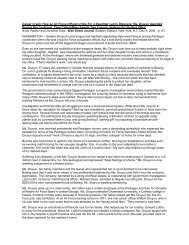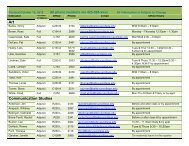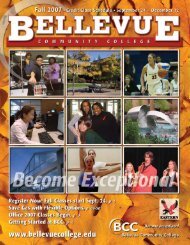2003 / 2004 - Bellevue College
2003 / 2004 - Bellevue College
2003 / 2004 - Bellevue College
Create successful ePaper yourself
Turn your PDF publications into a flip-book with our unique Google optimized e-Paper software.
<strong>College</strong> Survival Vocabulary<br />
words in italics appear elsewhere in<br />
the list<br />
academic concentration<br />
See major.<br />
academic year<br />
Usually this refers to the September–<br />
June school year. In some cases it<br />
refers to the entire year.<br />
accreditation<br />
Certification that a school or an instructional<br />
program meets standards<br />
set by an outside reviewing organization.<br />
Many forms of financial aid<br />
are available only to students attending<br />
accredited institutions.<br />
admission<br />
Approval for a student to attend<br />
an educational institution. The<br />
admission process usually involves<br />
an application form and<br />
may require transcripts or other<br />
supporting documents.<br />
advisor<br />
A member of the college faculty or<br />
staff who assists students with planning<br />
quarter or semester schedules as<br />
well as their overall programs of<br />
study. Advisors may also help with<br />
career planning. See also counselor.<br />
application<br />
The first step in requesting admission<br />
to an institution of higher education.<br />
Usually there is a form to fill<br />
out by a certain deadline; sometimes<br />
there is an application fee to<br />
pay.<br />
articulation<br />
A formal agreement between high<br />
schools and colleges or between<br />
community/technical colleges and<br />
baccalaureate institutions, designed<br />
to make it easy for students to<br />
move from one educational level to<br />
the next without any gaps or repetition<br />
in their coursework.<br />
assessment<br />
A method of determining a<br />
student’s knowledge or skill level,<br />
often taken to find his or her best<br />
placement or starting level in a series<br />
of courses in English, foreign<br />
languages, math, or science.<br />
130 • BCC Course Catalog ~ <strong>2003</strong> / <strong>2004</strong><br />
associate’s degree<br />
A diploma earned after successfully<br />
completing a required program of<br />
study in a community or technical<br />
college. It typically requires 90 or<br />
more credits and takes two years of<br />
full-time study. Some associate’s degrees<br />
enable students to transfer to<br />
baccalaureate colleges and universities,<br />
others prepare students to go<br />
right into the workforce in a professional/technical<br />
field.<br />
audit<br />
A student who audits a course formally<br />
registers for it and attends<br />
class sessions but earns no credit<br />
and has no obligation to complete<br />
homework projects or take tests.<br />
baccalaureate or bachelor’s<br />
degree<br />
A college degree which can often be<br />
earned by following a four-year instructional<br />
program. A baccalaureate<br />
institution, sometimes informally<br />
called a “four-year college,” is<br />
a college or university which is entitled<br />
to grant a baccalaureate or<br />
bachelor’s degree.<br />
basic skills<br />
Usually refers to a level of competency—specifically<br />
in reading, writing,<br />
and mathematics—which is required<br />
for successful college-level<br />
work in all fields of study.<br />
campus<br />
The land and buildings that a college<br />
or university uses for instruction<br />
or student services.<br />
catalog<br />
A comprehensive resource listing<br />
college regulations, program and<br />
course descriptions, degree and<br />
graduation requirements, transfer requirements,<br />
and other essential information.<br />
certificate<br />
A document granted by a college or<br />
university indicating that a student<br />
has successfully completed specified<br />
courses and requirements (compare<br />
with degree, which usually requires<br />
more time and coursework).<br />
class<br />
(1) A specific group of students meeting<br />
for specific instructional purposes.<br />
It can mean the whole series<br />
of scheduled meetings (“Dr. Owen<br />
is teaching two English Composition<br />
classes this quarter”) or just<br />
one session (“we had a guest<br />
speaker in my Home Economics<br />
class today”).<br />
(2) Often means the same as course<br />
(“she’s taking classes in Interior<br />
Design”).<br />
(3) A group of students who start at a<br />
school together and expect to complete<br />
their studies at the same time<br />
(“he’s in the graduating class of<br />
<strong>2003</strong>”).<br />
class schedule<br />
(1) A publication listing detailed<br />
course and section information<br />
(days, times, room numbers, etc.)<br />
for a specific semester or quarter.<br />
(2) The specific courses that an individual<br />
student is taking or plans<br />
to take for a given semester or<br />
quarter.<br />
college-level study<br />
Curricula and instruction that assume<br />
the student has already mastered<br />
certain skills and abilities and<br />
has the level of commitment needed<br />
for postsecondary school work. Compare<br />
to developmental-level study.<br />
commencement<br />
The ceremony at the end of an academic<br />
year when students receive<br />
their degrees or diplomas (compare<br />
to graduation).<br />
competency<br />
In “competency-based” courses or<br />
instructional programs, students<br />
must demonstrate certain skills<br />
and abilities (instead of just earning<br />
passing grades in classes) before<br />
moving from one level to the next or<br />
earning the final certificate or degree.<br />
counselor<br />
A member of the college faculty<br />
who has special training in guidance<br />
and who assists students in<br />
academic or personal matters. See<br />
also advisor.<br />
course<br />
(1) Often means the same as class.<br />
(2) A planned sequence of instruction<br />
in a particular topic; may include<br />
class meetings, lectures, readings,<br />
demonstrations, exercises, assignments,<br />
examinations, etc.; offered<br />
repeatedly to different groups<br />
of students.<br />
credit<br />
A unit of measure for college work.<br />
Generally speaking, one credit<br />
hour represents one hour of classroom<br />
attendance each week for<br />
one term, plus the study time,<br />
homework, etc. that go along with<br />
it.<br />
credit load<br />
The total credit value of the courses<br />
a student is currently enrolled in.<br />
curriculum<br />
(plural: curricula)<br />
(1) An established sequence of information<br />
to be learned, skills to be<br />
acquired, etc. in a specific course or<br />
in a complete instructional program.<br />
(2) Collectively, all the courses offered<br />
by a department, division, or college.<br />
dean<br />
An academic administrator or official<br />
at a school, college, or university,<br />
especially one with responsibility<br />
for students or faculty.<br />
degree<br />
A rank conferred by a college or university<br />
and earned by a student who<br />
has successfully completed specified<br />
courses and requirements (compare<br />
with certificate, which usually requires<br />
less time and coursework).<br />
department<br />
An organizational unit within a<br />
college or university, offering<br />
courses about closely related topics<br />
(at a small school there may be one<br />
foreign languages department, at a<br />
large school there may be separate<br />
departments for Spanish, French,<br />
Japanese, etc.)<br />
developmental-level study<br />
Instruction that helps students improve<br />
their English and math abilities<br />
and prepare themselves for college-level<br />
study.


